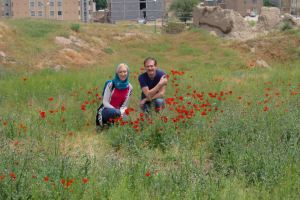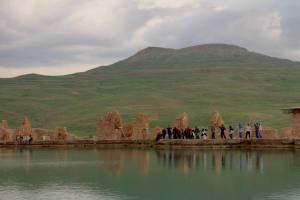A year ago, my husband and I decided to visit Iran. At the time, we resided in Azerbaijan–that small, independent state that borders northern Iran. A lifelong fan of Persian culture, my husband was extraordinarily keen on making his way south, and I myself sought to explore southern Azerbaijan, which is currently part of Iran and not part of independent Azerbaijan. We hired a state-approved guide, applied for a visa, and arranged to meet our guide in Astara, on the Iranian side of the Azerbaijani-Iranian border.
For most Americans, the word “Iran” conjures negative images and is associated with global aggression, a threat to American interests, hostage-taking, repression, and an alien way of life. Our neighbors in the USA, for instance, expressed shock at our decision to enter Iran and were thoroughly convinced that we would be arrested. Their memories blurred the Iranian Revolution of 1979 and the siege of the American embassy with more contemporary images of war-torn Iraq, ISIS and Al Qaeda fighters, and the Boston bombing. Somehow, in these visions, the idea that Iranians have personal, artistic and intellectual aspirations and activities that cannot be defined in terms of top-down politics or fundamentalist Islam remains alien, though of course Iran cannot be understood without a consideration of these, too. We wanted to see these elements of Iranian life.
Needless to say, as two Americans, we drew a great deal of attention. With my blond hair and loose interpretation of the Iranian dress code for women, I stood out like a sore thumb–clearly foreign, possibly American. We were curious about Iran, yes, but we sparked an equal degree of curiosity in return. Actually, curiosity is too soft a term; the more appropriate word would be excitement.
Everywhere we went, we encountered people eager to connect to us. In Tabriz, a teenaged boy near the Blue Mosque actually jumped with excitement, exclaiming, “I cannot believe it! I cannot believe it!” when he learned that we hailed from the USA. A clear enthusiast of American movies, downloaded “on the sly” (by circumventing state restrictions on internet content), he had developed an impressively strong command of English. He peppered us with questions such as “Where do you live?” and “Do you know Johnny Depp?” (always in flawless English). Outside Tabriz, we met a young couple eager to converse and share–again, in excellent English. In Kashan (the furthest south we traveled), we found a host of Iranian tourists seemingly more eager to photograph us than the historic architecture of Kashan.
We were, in a way, celebrities and diplomats. Even in rural areas, groups of men or boys would gather, forming a small crowd eager to chat with my husband, putting his Farsi knowledge to the test or else using our guide as interpreter. In urban areas, these greetings were particularly open and warm, and on one or two occasions we came away feeling deeply connected to our interlocutors, as if we’d known these people of education, reflection, kindness, and hospitality for a very long time. In every city, someone would declare us to be a sign of improved relations with the USA–a sign that the election of Iran’s new president, Hassan Rouhani, indeed augured something new. At all times, we were treated not an emissaries of the enemy, but as guests and friends, if not as representatives of a land where life was, at least on many levels, freer and better than at home.
It would be wrong to suggest that Iranians felt universally free to openly converse with us, even on neutral topics. A cautious woman in the Tabriz bazaar engaged me in conversation, but did so covertly, pointing repeatedly to a display of bangles in the gold bazar, as if to suggest that she was advising me, a hapless tourist, on jewelry, not asking after me as a person. In Maragheh, a conservatively dressed woman in black chador (but highly fashionable shoes and eye glasses) crossed the street, tugged on my shirt sleeve and asked, “Where are you from?” Upon hearing my answer, she responded, “Welcome to Iran! Thank you for coming! We are delighted you are here!” and then disappeared into the crowd.
While my husband and I were certainly experiencing the joys of Iranian’s famous hospitality, yet another influence was at play–namely, a genuine fascination with the United States. We were embraced not only as individuals, but as emissaries from a mysterious “other place” renowned for its scope of personal freedom. In this regard, a few particularly brave souls specifically denigrated Iranian authorities, while praising the American government. “America good,” they might say, while complaining of repression at home. Such conversations were brief and private, of course, being possible only in moments where our guide had disappeared. But, they captured not only discontent, but also something else–our place as symbols of another world, the perceived antipode to Iran.
I confess that these engagements produced some awkwardness on our part, for my husband and I are fans of Iranian culture as well as critics of US foreign policy and of Hollywood film, which many of our new Iranian acquaintances clearly adored. We felt uncomfortable with the black-and-white dichotomy drawn between a “good USA” and a “bad Iran,” though of course we could not deny the level of repression in Iranian society. Still, both American and Iranian societies are complex, with both repressive and liberating impulses to be found at all levels of state and society. Iran has emancipatory inklings, just as American culture has its repressive, exclusionary elements. Just ask Native Americans, or the American Black.
Confronted with our unexpected role as representatives of the USA, I found myself thinking of the “imaginary West” that once animated the Soviet popular imaginary. As Alexei Yurchak notes, Soviet citizens’ West existed only in the Soviet Union, in the fantasies and images of the last Soviet generation. This imagined West did not outlive the collapse, for it was in fact the product of Soviet isolation–of highly selective engagement with the real West, often through unofficial or quasi-dissident modes of communication that centered on popular culture as a site of freedom, experimentation, and desire. When the dissolution of the Soviet Union permitted free movement to and from the West, many Soviet citizens experienced deep disappointment and disillusionment: the West was not the perfect antipode to the grey, dull bureaucracy at the top of Soviet life, but more contradictory, more complex, and less pristine, marked by its own dull grey conservatism and uniformity. Would the real West likewise disappoint these Iranians? Undoubtedly. Certainly, they would confront individuals and organizations with the very same restrictive impulses that currently dominate the Iranian leadership.
As I reflect on Iran, I wonder what will happen if Iran does open to the West, undergoing a complete regime change in the process. How long will the American-Iranian love affair last? Will it prove more durable than that of Russia and the United States? Or will long-standing patterns of state policy and “strategic enmity” linger? Will personal relationships withstand the burden of politics?
Would my husband and I enjoy the same welcome if there were no “imaginary America” in the Iranian popular mind? I doubt it. Hospitality would remain, of course. But, the open and enthusiastic embrace would disappear. After all, we were embraced as symbols of something that does not exist. We (Americans) were seen to be too kind, too educated, too open-minded, and in general too straight-forward and without contradiction.
If only such naiveté, this positive view of “the other,” were deliberately chosen, a conscious way of reaching across a divide. That is the sort of imaginary that the future requires. This one, sadly, cannot last, and Americans’ own hostility to Iran and Iranians will facilitate its demise.




This is a beautifully written writing and very enjoyable to read.
LikeLiked by 1 person